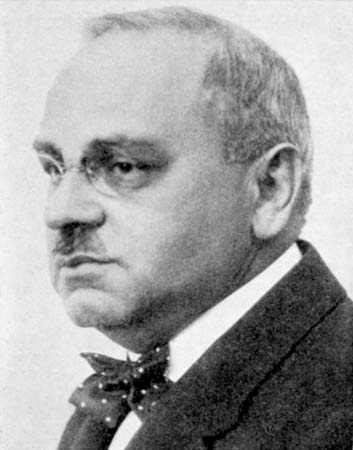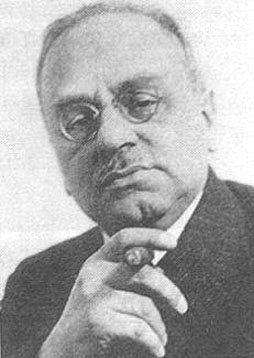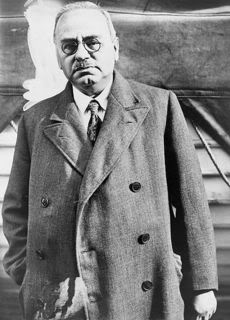<Back to Index>
- Psychiatrist Alfred Adler, 1870
- Architect Bernard Ralph Maybeck, 1862
- Prime Minister of France Alexandre Félix Joseph Ribot, 1842
PAGE SPONSOR



Alfred Adler (February 7, 1870, Mariahilfer Straße 208, Rudolfsheim, Rudolfsheim-Fünfhaus – May 28, 1937) was an Austrian medical doctor, psychologist and founder of the school of individual psychology. In collaboration with Sigmund Freud and a small group of Freud's colleagues, Adler was among the co-founders of the psychoanalytic movement as a core member of the Vienna Psychoanalytic Society. He was the first major figure to break away from psychoanalysis to form an independent school of psychotherapy and personality theory. This was after Freud declared Adler's ideas as too contrary, leading to an ultimatum to all members of the Society (which Freud had shepherded) to drop Adler or be expelled, disavowing the right to dissent. Following this split, Adler would come to have an enormous, independent effect on the disciplines of counseling and psychotherapy as they developed over the course of the 20th century. He influenced notable figures in subsequent schools of psychotherapy such as Rollo May, Viktor Frankl, Abraham Maslow and Albert Ellis. His writings preceded, and were at times surprisingly consistent with, later neo-Freudian insights such as those evidenced in the works of Karen Horney, Harry Stack Sullivan and Erich Fromm.
Adler
emphasized the importance of equality in preventing various forms of
psychopathology, and espoused the development of social interest and
democratic family structures for raising children. His most famous
concept is the inferiority complex which
speaks to the problem of self-esteem and its negative effects on human
health (e.g. sometimes producing a paradoxical superiority striving).
His emphasis on power dynamics is rooted in the philosophy of Nietzsche.
Adler argued for holism, viewing the individual holistically rather
than reductively, the latter being the dominant lens for viewing human
psychology. Adler was also among the first in psychology to argue in
favor of feminism making
the case that power dynamics between men and women (and associations
with masculinity and femininity) are crucial to understanding human
psychology. Adler is considered, along with Freud and Jung, to be one of the three founding figures of depth psychology, which emphasizes the unconscious and psychodynamics. Alfred Adler was the second child of seven children of a Hungarian-born, Jewish grain merchant and his wife. Early on, he developed rickets, which kept him from walking until he was four years old. He almost died
of pneumonia when he was five and it was at this age that he decided to
be a physician. Alfred
was an active, popular child and an average student who was also known
for his competitive attitude toward his older brother, Sigmund. In 1895 he received a medical degree from the University of Vienna.
During his college years, he became attached to a group of socialist
students, among which he found his wife-to-be, Raissa Timofeyewna
Epstein, an intellectual and social activist from Russia studying in
Vienna. They married in 1897 and had four children, two of whom became
psychiatrists. He began his medical career as an ophthalmologist,
but he soon switched to general practice, and established his office in
a lower class part of Vienna, across from the Prater, a combination
amusement park and circus. His clients included circus people, and it
has been suggested that the unusual strengths and weaknesses of the performers led to his insights into "organ inferiorities" and "compensation". In
1902 Adler received an invitation from Sigmund Freud to join an
informal discussion group that included Rudolf Reitler and Wilhelm
Stekel. They met regularly on Wednesday evenings at Freud's home, with
membership expanding over time. This group was the beginning of the
psychoanalytic movement (Mittwochsgesellschaft or the "Wednesday Society"). A long-serving member of the group, Adler became President of the Vienna Psychoanalytic Society eight
years later (1910). He remained a member of the Society until 1911 when
he and a group of supporters formally disengaged, the first of the
great dissenters from Freudian psychoanalysis (preceding Carl Jung's
notorious split in 1914). This departure suited both Freud and Adler
since they had grown to dislike each other. During his association with
Freud, Adler frequently maintained his own ideas which often diverged
from Freud's. While Adler is often referred to as a "a pupil of
Freud's", in fact this was never true; they were colleagues. In 1929
Adler showed a reporter with the New York Herald a copy of the faded
postcard that Freud had sent him in 1902. He wanted to prove that he
had never been a disciple of Freud's but rather that Freud had sought
him out to share his ideas. Adler
founded the Society of Individual Psychology in 1912 after his break
from the psychoanalytic movement. Adler's group initially included some
orthodox Nietzschean adherents (who believed that Adler's ideas on
power and inferiority were closer to Nietzsche than were Freud's).
Their enmity aside, Adler retained a lifelong admiration of Freud's
ideas on dreams and credited him for creating a scientific approach to
their clinical utilization. Nevertheless, even with
dream interpretation, Adler had his own theoretical and clinical
approach. The primary differences between Adler and Freud centered on
Adler's contention that the social realm (exteriority) is as important
to psychology as is the internal realm (interiority). The dynamics of
power and compensation extend beyond sexuality and the arena of gender
and politics are important considerations that go beyond libido.
Moreover, Freud did not share Adler's socialist beliefs. Trotsky's
biography mentions his having discussions with Alfred Adler in Vienna. Following Adler's break from Freud, he enjoyed considerable success and celebrity in building an independent school of psychotherapy and a unique Personality Theory.
He traveled and lectured for a period of 25 years promoting his
socially oriented approach. His intent was to build a movement that
would rival, even supplant, others in psychology by arguing for the
holistic integrity of psychological well-being with that of social
equality. Adler's efforts were halted by World War I,
during which he served as a doctor with the Austrian Army. After the
conclusion of the war, his influence increased greatly. In the 1930s,
he established a number of child guidance clinics. From 1921 onwards,
he was a frequent lecturer in Europe and the United States, becoming a
visiting professor at Columbia University in 1927. His clinical
treatment methods for adults were aimed at uncovering the hidden
purpose of symptoms using the therapeutic functions of insight and
meaning. Adler
was concerned with the overcoming of the superiority/inferiority
dynamic and was one of the first psychotherapists to discard the
analytic couch in favor of two chairs. This allows the clinician and
patient to sit together more or less as equals. Clinically, Adler's
methods are not limited to treatment after-the-fact but extend to the
realm of prevention by preempting future problems in the child. Prevention strategies include encouraging and promoting social
interest, belonging, and a cultural shift within families and
communities that leads to the eradication of pampering and neglect
(especially corporal punishment). Adler's popularity was related to the
comparative optimism and comprehensibility of his ideas. He often wrote
for the lay public — unlike Freud and Jung,
who tended to write almost exclusively for an academic audience. Adler
always retained a pragmatic approach that was task-oriented. These
"Life tasks" are occupation/work, society/friendship, and
love/sexuality. Their success depends on cooperation. The tasks of life
are not to be considered in isolation since, as Adler famously
commented, "they all throw cross-lights on one another". In his bestselling book, Man's Search for Meaning, Dr. Viktor E. Frankl compared his own "Third Viennese School of Psychotherapy" (after Freud's and Adler's schools) to Adler's analysis: In
the early 1930s, after most of Adler's Austrian clinics were closed due
to his Jewish heritage (although he had converted to Christianity),
Adler left Austria for a professorship at the Long Island College of
Medicine in the USA. Adler died from a heart attack in Aberdeen, Scotland, during a lecture tour in 1937. At the time it was a blow to
the influence of his ideas although a number of them were taken up by neo-Freudians. Through the work of Rudolf Dreikurs in
the United States and many other adherents worldwide, Adlerian ideas
and approaches remain strong and viable more than 70 years after
Adler's death. Around
the world there are various organizations promoting Adler's orientation
towards mental and social well-being. These include the International
Committee of Adlerian Summer Schools and Institutes (ICASSI), the North
American Society for Adlerian Psychology (NASAP) and the International
Association for Individual Psychology. Teaching institutes and programs
exist in Austria, Canada, England, Germany, Greece, Israel, Italy,
Japan, Latvia, Switzerland, the United States, Jamaica, Peru, and Wales. Adler was influenced by the mental construct ideas of the philosopher Hans Vaihinger (The Philosophy of As If / Philosophie des Als Ob) and the literature of Dostoevsky. While still a member of the Vienna Psychoanalytic Society he
developed a theory of organic inferiority and compensation that was the
prototype for his later turn to phenomenology and the development of
his famous concept, the inferiority complex. Adler was also influenced by the philosophies of Immanuel Kant, Friedrich Nietzsche, Rudolf Virchow and the statesman Jan Smuts (who coined the term "holism"). Adler's School, known as "Individual Psychology" — an arcane reference to the Latin individuus meaning
indivisibility, a term intended to emphasize holism — is both a social
and community psychology as well as a depth psychology. Adler was an
early advocate in psychology for prevention and emphasized the training
of parents, teachers, social workers and so on in democratic approaches
that allow a child to exercise their power through reasoned decision
making whilst co-operating with others. He was a social idealist, and
was known as a socialist in his early years of association with
psychoanalysis (1902 – 1911). His allegiance to Marxism dissipated over time (he retained Marx's social idealism yet distanced himself from Marx's economic theories).